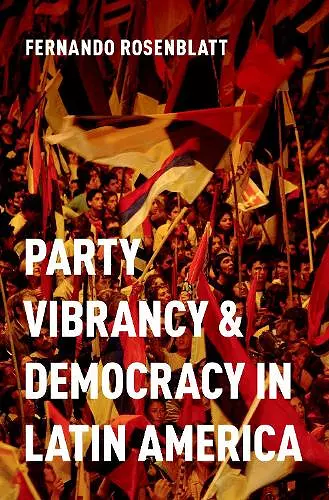Party Vibrancy and Democracy in Latin America
Format:Hardback
Publisher:Oxford University Press Inc
Published:7th Jun '18
Currently unavailable, and unfortunately no date known when it will be back
This hardback is available in another edition too:
- Paperback£24.99(9780197582602)

Even in Latin America's most socially and economically stable countries, new parties emerge constantly, old parties collapse, and party systems across the region are notoriously fragile. Still, there are also successful stories. There have been a number of parties in Colombia, Chile, and Venezuela that used to be able to operate well beyond electoral cycles and preserve a significant presence in their respective countries for decades. How do such political parties remain vibrant organizations over time? In Party Vibrancy and Democracy in Latin America, Fernando Rosenblatt sheds new light on how party vibrancy is maintained and reproduced over time in three of the region's more stable countries-Chile, Costa Rica, and Uruguay. Referencing these three "consolidated" democracies with records of good governance, Rosenblatt identifies the complex interaction between four causal factors that can explain party vibrancy: Purpose, Trauma, Channels of Ambition, and Moderate Exit Barriers. "Purpose" activates prospective loyalty among party members. "Trauma" refers to a shared traumatic past which engenders retrospective loyalty. "Channels of Ambition" are established routes by which individuals can pursue political careers. Finally, "Moderate Exit Barriers" are rules that set costs of defection at reasonable levels. When these factors work together throughout a party's "Golden Age," they can demonstrate a link between party organizations´ stability and the quality of democratic representation across Latin America. As Rosenblatt finds, when parties remain vibrant organizations, democracies are better able to withstand challenges long-term. A unique qualitative study, Party Vibrancy and Democracy in Latin America demonstrates how the vitality of political parties can directly and indirectly impact how effective they are as intermediaries for their citizens not just in Latin America, but around the world.
Political parties are an integral part of most political systems. Rosenblatt conducted extensive interviews from 2010 to 2014 with many political activists in Chile, Costa Rica, and Uruguay, three of Latin America's currently most stable democracies. He attributes the stability of these regimes to "party vibrancy," acondition based on party institutionalization not tied to a particular candidate or factor... Despite many challenges, parties in Chile, Costa Rica, and Uruguay have survived as significant channels of democratic representation and served their nations well.While drawing the examples from Latin America, Rosenblatt's conclusions are broadly applicable to political parties anywhere in the world. The book belongs in all academic libraries. * J. A. Rhodes, emeritus, Luther College, CHOICE *
- Winner of Winner of the Carlos Real de Azúa book award, of the Uruguayan Political Science Association.
ISBN: 9780190870041
Dimensions: 160mm x 236mm x 31mm
Weight: 544g
304 pages